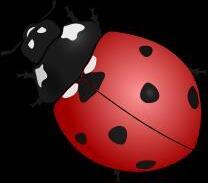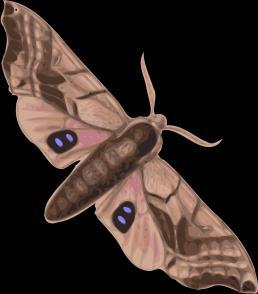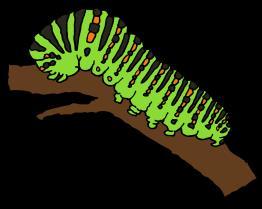The University of Texas at San Antonio School of Music Presents
Everything I Know
Proficiency Recital
April 6, 2024 3:00 PM | UTSA Recital Hall
Madeline Gutierrez, soprano
Anna Hakobyan, piano

Bergerettes
Program order
Non Je N'irai Plus Au Bois
L’Amour S’Envole
Va Godendo from Serse
Die Vögel
Die Forelle
Bug Songs
Ladybugs
Moth Miller
Fireflies
Caterpillars
“We Kiss in the Shadows” from The King and I Featuring De’von O’Neal
Jean Baptiste Weckerlin (1821 -1910)
George Frideric Handel (1685- 1789)
Franz Schubert (1797- 1828)
George Lynn (1915 -1989)
Richard Rodgers (1902 -1979)
“Unexpected Song” from Song and Dance
“Everything I Know” from In the Heights
Andrew Lloyd Webber (b.1948)
Lin Manuel Miranda (b.1980)
Bergerettes
Jean Baptiste Weckerlin (1821 -1910)
Jean -Baptiste The ó dore Weckerlin was a French composer and publisher born in Grand est, France in 1821. He is best known for his piano compositions along with his major work Bergerettes, romances et chansons du XVIII si ècle, published in 1860. The Bergerettes tell pastoral stories of love, and heartbreak. In many instances the Bergerettes are arrangements of existing folk songs.
The first piece from this set is Non Je N’irae Plus Au Bois (No I Will No Longer Go Into the Woods). This song is about a young woman named Lisette who ventures into the woods alone and encounters a shepherd who tries to take advantage of her innocence. She is saved by another woman named Climene, but after this event swears, she will never go into the woods alone again.
The second piece in this set is L’Amour S’Envole (Love Flies Away). This song is about how love requires a delicate balance and can quickly go away if either partner is not treated well. These lyrics are centered around a metaphor for how quickly fleeting love can be , much like Cupid when he flies away.
Non Je N’irai Plus Au Bois (No I Will No Longer Go Into the Woods)
Translations provided by Madeline Gutierrez
Non, je n'irai plus au bois, Non, non, je n'irai plus seulette, Un seul moment l'autre fois, Un instant que deveniail Lisette
Non, je n'irai plus au bois, Non, non, je n'irai plus seulette, Je connais trop le danger
Ou l'amour pourrait m'engager.
L'autre jour, sous un ormeau, Je vis pres de moi, sur l'herbette, Un jeune berger du hameau; Prete a l'eviter, Il veut m'attraper.
Tircis, d'un air tentre, Me regardait.
Un baiser en flamme
Soudain vint m'apprendre
Ce qui'l demandait,
Sans pitie pour ma peine, Il me prit dans ses bras
Quand nous vimes Climene
Sans elle, helas!
No, I will no longer go to the woods, No, no, I won't go alone anymore, One moment the other time, An instant that transformed Lisette
No, I will no longer go to the woods, No, no, I won't go alone anymore, I know too well the danger love could engage me.
The other day, under a tree, I saw near to me, on the grass, A young shepherd from the village ; Ready to avoid him, He wants to catch me.
Tircis, with a tender air, Was looking at me.
A kiss enflamed
Suddenly came to impart that What he demanded,
Without pity for my pain, He took me in his arms When we saw Climene Without her, alas!
Translations provided by Bard Souverkrop
L'amour est un enfant timide La sévérité lui fait peur; C'est la liberté qui le guide Pour trouver le chemin d'un cœur.
Tandis qu'il n'a rien à craindre, Les ris et les jeux suivent ses pas, Mais dès qu'on le veut contraindre Il s'envole et ne revient pas.
The-love is a child timid, the severity him causes fear; it-is the freedom that him leads/guides in-order to-find the path to-a heart.
While that-he not-has anything to fear, the smiles and the joys follows his steps, but as-soon as-one him wants to-restrain he flies-off and not returns ever.
L
’Amour S’Envole (Love Flies Away)
George Frideric Handel (1685 -1789)
from Serse
George Frederic Handel was a German -British Baroque composer from the Baroque era. He was internationally known for his many operas, oratorios, anthems, concerti grossi, and organ concertos. This aria is from his opera Serse (Xerxes) that was first performed in 1738, with the book written by librettist Giovannni Bononcini. Serse is a three-act opera about a king who falls in love with a woman (Romilda) after hearing her sing in the garden. However, he is already engaged to another woman, and Romilda is alre ady in love with the king’s brother. Ultimately the king banishes his brother, and makes an unrefusable marriage offer to the woman ’s father. This aria is sung by the character Romilda and compares the feeling of being in love to a free brook flowing with joy .
Va Godendo (Go Joyfully)
Translations provided by Thomas A. Gregg
Và godendo
Vezzoso e bello
Quel ruscello la libertà,
E tra l’erbe con onde chiare
Lieto al mare correndo và.
Go in joy, happy and beautiful
That stream, liberty (freedom) itself.
And between the grass with bright waves, merrily to the sea go running.
Franz Schubert (1797 -1828)
Franz Schubert was born in Himmelpfortgrund , Vienna, Austria in 1797. His music is described as bridging the gap between the classical era and the romantic era. Before his death in 1828, Schubert composed seven complete symphonies, multiple operas, various piano and chamber pieces, and over 600 secular vocal works. For this recital , I will be performing two of his secular works.
The first one in this set is Die Vö gel (The Bird). This song is about a bird that is singing joyfully while enjoying a flight. The piece also discusses how unfortunate it is for humans who are unable to fly, and how an angry hunter will never be able to catch the bird.
The second piece in this set is Die Forelle (The Trout). This art song is sung from the perspective of a person watching a little trout peacefully swim around in a brook when a fisherman comes to murder the innocent fish.
Wie lieblich und fröhlich, Zu schweben, zu singen, Von glänzen der Höhe, Zur Erde zu blicken!
Die Menschen sind thöricht, Sie können nicht fliegen Sie jammern in Nöthen, Wir flattern gen Himmel.
Der Jäger will tödten, Dem Früchte wir pickten; Wir müssen ihn höhnen, Und Beute gewinnen.
Die Vögel (The Bird)
Translations provided by David Gordon
How delightful and exhilarating To soar, to sing, From the shining heights! To look down on the earth
Men are foolish: They cannot fly. They lament in their troubles; We fly up to the heavens.
The huntsman wants to kill us, Whose fruit we pecked, But we should mock him And snatch our spoils .
Die Forelle (The Trout)
English Translation Provided by Richard Wigmore
In einem Bächlein helle, Da schoß in froher Eil'
Die launische Forelle
Vorüber wie ein Pfeil.
Ich stand an dem Gestade
Und sah in süßer Ruh
Des muntern Fischleins Bade
Im klaren Bächlein zu.
Ein Fischer mit der Rute
Wohl an dem Ufer stand,
Und sah's mit kaltem Blute, Wie sich das Fischlein wand.
So lang dem Wasser Helle, So dacht ich, nicht gebricht, So fängt er die Forelle
Mit seiner Angel nicht.
Doch endlich ward dem Diebe
Die Zeit zu lang. Er macht
Das Bächlein tückisch trübe, Und eh ich es gedacht, So zuckte seine Rute,
Das Fischlein zappelt dran, Und ich mit regem Blute
Sah die Betrogene an.
In a limpid brook the capricious trout in joyous haste darted by like an arrow. I stood on the bank in blissful peace, watching the lively fish swim in the clear brook.
An angler with his rod stood on the bank cold-bloodedly watching the fish’s contortions.
As long as the water is clear, I thought, he won’t catch the trout with his rod.
But at length the thief grew impatient. Cunningly he made the brook cloudy, and in an instant his rod quivered, and the fish struggled on it. And I, my blood boiling, looked on at the cheated creature.
Bug Songs
George Lynn (1915 -1989)
This next set of songs is written by composer George Lynn who was an American composer born in Pennsylvania in 1915. He composed over 200 works and taught at several universities around the United States throughout his lifetime.
One of his song collections is called Bug songs, and this set will present four out of the seven songs from that collection. Each song tells an adorable story about a different insect. For example, a ladybug going to the market, a moth miller, fireflies playing in the night sky with the help of batteries to power their lights, and the puzzling mystery of a caterpillar ’s metamorphosis.
Ladybugs

Do ladybugs go marketing on early morning walks Up and down the rhubarb leaves and over rhubarb stalks They never carry market bags, but then they are so small Perhaps they just buy nibblings, and nothing else at all.

Moth Miller
The timid moth that flutters around our light at night, has silver dust upon his wings and tiny flecks of white, and if I look more closely there is flour upon his clothes, but that is just because he is a miller I suppose.
Fireflies
In the soft dark night when the wind is still, and crickets fiddle beneath the hill.
Fireflies reach in their coats with ease, and screw little bulbs to their batteries. So they can fly through the night and play, And not bump their heads, or lose their way.


Caterpillars
When caterpillars go to sleep inside their silk cocoons
I wonder if they dream throughout the drowsy afternoons about the butterflies they’ll be. Lovely light and thin.
Or can’t a creature dream about what he has never been.
Golden Age of Musical Theater
The first of this set is We Kiss in the Shadows from Rodgers & Hammerstein ’s The King and I. This musical first premiered on Broadway in 1951 and beautifully demonstrates the golden age of Broadway. The composer Richard Rodgers is one of the most well-known American composers of the 20th century. He is credited with composing over 43 musicals, and 900 songs. This musical, The King and I is based on the true story of a Welsh school teacher named Anna Leonowens who travels to Siam (now modern -day Thailand) to serve as a governess and teacher to King Mongkut's children and wives. The song We Kiss in the Shadows is sung by Tuptim (a slave girl from Burma who was given as a gift to the king to become another one of his many wives), and Lun Tha (a scholar in the palace who was assigned to escort Tuptim).
“We Kiss in the Shadows ”
from The King and I Richard Rogers (1902-1979)
Lun Tha:
We kiss in a shadow, We hide from the moon, Our meetings are few And over too soon.
We speak in a whisper, Afraid to be heard.
When people are near, We speak not a word.
Alone in our secret, Together we sigh
For one smiling day to be free,
To kiss in the sunlight
And say to the sky:
“Behold and believe what you see!
Behold how my lover loves me!”
Tuptim:
We speak in a whisper, Afraid to be heard.
When people are near, We speak not a word.
Lun Tha:
Alone in our secret, Together we sigh
For one smiling day to be free,
Both:
To kiss in the sunlight
And say to the sky:
“Behold and believe what you see!
Behold how my lover loves me!”
80s Musical Theater
The next song in this set is from the musical Song and Dance written by Andrew Lloyd Webber. The lyrics were written by lyricist Don Black. Don Black was born in London in 1938 and has written lyrics for many famous musicians including: Michael Jackson, Quincy Jones, Meatloaf, and Henry Mancini.
Song and Dance is a Tony-nominated musical that first premiered in London in 1982. The musical is a one woman show that tells the story of Emma an aspiring hat designer as she journeys to various places to find love. The first act tells the story entirely through song, and the second act tells the story entirely through dance. Unexpected Song is sung by Emma in the first act as she explains how it feels to experience being in love for the first time in her life.
“Unexpected Song ”
from Song and Dance
Andrew Lloyd Webber (b.1948)
I have never felt like this
For once I'm lost for words
Your smile has really thrown me
This is not like me at all
I never thought I'd know
The kind of love you've shown me
Now, no matter where I am
No matter what I do
I see your face appearing
Like an unexpected song
An unexpected song
That only we are hearing
I don't know what's going on
Can't work it out at all
Whatever made you choose me?
I just can't believe my eyes
You look at me as though
You couldn't bare to lose me
I have never felt like this
For once I'm lost for words
Your smile has really thrown me
This is not like me at all
I never thought I'd know
The kind of love you've shown me
Now no matter where I am
No matter what I do
I see your face appearing
Like an unexpected song
An unexpected song
That only we are hearing
Like an unexpected song
An unexpected song
That only we are hearing
Contemporary Musical Theater
The final song of this set is from Lin Manuel Miranda ’s Tony award-winning musical In the Heights. This musical first premiered in 2005 and represents the contemporary style of musical theater that began showing up in Broadway theaters beginning in 2000. In the Heights takes place over the course of three days and tells the story of various fictional characters that live in Washington Heights (a Latinx neighborhood in New York City).
Everything I Know is sung by the character Nina, a young woman who recently came back home to the Heights after dropping out of Stanford University. Nina ’s abuela (Claudia) passed away just moments before this song takes pla ce in the show and is sung while Nina goes through her abuela ’s boxes of memories. Going through Claudia ’s belongings inspires Nina to go back to college and make her proud.
This song is dedicated to Madeline ’s own Abuelita who passed away in June of 2019.

In this album, there's a picture
Of the ladies at Daniela's
“Everything I Know ”
from In the Heights
Lin Manuel Miranda (b.1980)
You can tell it's from the 80s by the volume of their hair
There's Usnavi, just a baby
'87, Halloween
If it happened on this block
Abuela was there
Every afternoon I came
She'd make sure I did my homework
She could barely write her name
But even so
She would stare at the paper and tell me, "Bueno, Let's review. Why don't you tell me everything you know?"
In this album there's a picture
Of Abuela in Havana
She is holding a rag doll
Unsmililng, black and white.
I wonder what she's thinking
Does she know that she'll be leaving
For the city on a cold dark night?
And on the day they ran
Did she dream of endless summer?
Did her mother have a plan?
Or did they just go?
Did somebody sit her down and say, "Claudia, get ready, to leave behind everything you know."
Everything I know
What do I know?
In this folder there's a picture
Of my high school graduation
With a program, mint condition
And a star beside my name
Here's a picture of my parents
As I left for California
She saved everything we gave her
Every little scrap of paper
And our lives are in these boxes
While the woman who held us is gone
But we go on, we grow
So, hold tight, Abuela, if you're up there
I'll make you proud of everything I know
Thank you, for everything I know.






